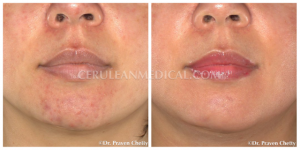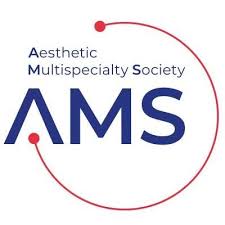Now that everyone is wearing a mask so often, a common skin problem called Maskne or mask acne has emerged. Many people have experienced acne, rosacea, dryness, or irritation due to wearing a mask frequently. Thankfully, our experienced cosmetic dermatology experts at Cerulean Medical Institute in Kelowna, BC can help with effective treatment and advice to prevent maskne.
What is Maskne?
Maskne, or mask acne, is a breakout that occurs on your chin, around the mouth, on your nose or on your cheeks due to wearing a mask for extended periods of time. This problem has been common among people who had to wear masks frequently, such as health care workers, for years. However, now that the general public is wearing masks for a prolonged period of time, maskne is becoming more prevalent. Maskne is the commonest mask related skin reaction and is referred to Acne Mechanica in dermatology. Other mask related dermatosis include rosacea, contact dermatitis, or folliculitis in the area that falls under your mask.
What Causes Maskne?
Typically, maskne is caused by clogged pores. When you are wearing a mask, oil, dead skin cells, or bacteria are more likely to build up on the skin and block the pores, resulting in acne. In addition, your mask traps humidity from your breath or sweat by design, as the covering is intended to stop droplets from spreading through the air. However, this increases the risk of acne, as the mask traps pore-clogging moisture and bacteria close to your skin.
Some patients may also experience breakouts due to friction, irritating or chafing the skin (acne mechanica). Finally, in some other cases, you may have a sensitivity or allergic reaction to a mask. Causes for such reactions include elastic bands, metal wires, adhesive chemicals as well as washing detergents, causing a reaction such as contact dermatitis.
How Can I Prevent Maskne?
There are several steps you can take to prevent maskne. After taking these simple steps, however, it is normal to still see some breakouts while wearing a mask. If you still see acne even when taking steps to prevent it, you can schedule a consultation for professional treatments.
Prevent Irritation from Your Mask
The first is to make sure your mask is suitably protective but doesn’t cause irritation due to the fabric or other factors. A mask should fit comfortably but snugly, which prevents it from sliding around on your face and irritating or chafing the skin. A proper fit also prevents you from touching your face, which can transmit bacteria to the skin, which can both cause you to get sick and contribute to acne. Ideally, the innermost layer of fabric should be a breathable, soft, triple layered with natural fiber such as cotton. It is important to remember not to wear makeup under your mask and take mask breaks when it is safe to do so. Face masks should be changed daily. It is important to wear a clean mask whether they are disposable or non-disposable in nature. Check the detergent you are washing your mask with. Laundry detergents are common sources of irritation and skin allergies. If you are still finding that your skin is irritated, try switching to a dye-free, unscented detergent.
Simplify Your Skin Care
When facing acne, it’s common to start trying multiple new skin care products to treat the breakout. However, you can help to prevent maskne by limiting the skin care products that you apply. Stick to a simple but proven routine that is suitably moisturizing for your skin type and doesn’t clog pores or irritate the skin. Be aware not to over exfoliate as this might exacerbate acne breakouts. Limit exfoliation to two to three times per week. In addition to simplifying your skin care routine, avoid wearing makeup as much as possible, as makeup can clog the pores. At the very least, do not apply makeup to the area that is covered by your mask where you have acne.
Choose an Effective Skin Care Routine
Finally, remember to follow your simple skincare routine daily. This includes twice daily cleansing and toning your skin to remove oil, bacteria, and dead skin cells and applying moisturizer as needed. Remember to gently exfoliate the skin once or twice a week to reduce skin cells that can clog pores. At Cerulean Medical Institute, Dr. Chetty and his skin care team can help you find a suitable everyday skin care routine with dermatologist-recommended, professional-quality products.
How Can I Treat Maskne?
There are several treatment options available for maskne, and the best choice for you depends on the specific type of acne or irritation you are suffering from, your skin type, and other factors. Often, acne treatment can involve topical medications or other treatment options. Alternatively, Dr. Chetty may recommend a new at-home skin care routine that is better suited to your needs.
Skin Care
A skin care routine that works well with your skin type and changing needs is one of the simplest ways to manage maskne. At Cerulean Medical Institute, our professionals can help suggest a skin care routine that includes effective products tailored to your skin type and is well suited to your lifestyle. We offer evidenced based ZO skin care products, which were formulated by a world-renowned dermatologist and contain scientifically proven ingredients. In addition to everyday products such as spot treatments that can be added to your daily routine, products such as clay masques and exfoliating cleansers may be recommended to use several times a week to help reduce and clear your acne. After a thorough consultation, Dr. Chetty will recommend the at-home skin care that will work best to treat your maskne and keep your skin healthy.
Chemical Peels
Chemical peels may be a suitable treatment for your acne. Chemical peels are available in varying formulas and can help treat acne by removing dead skin cells and other substances that may clog pores. Typically, light, mild chemical peels, also known as superficial chemical peels or “lunchtime peels,” are selected for patients dealing with acne. These peels typically require no downtime, though you will see some redness and feel some tenderness; most patients describe this as similar to a sunburn. While a light chemical peel typically requires no downtime, wearing a mask immediately after your peel could cause irritation. Dr. Chetty may recommend that you wait until you have some time to stay at home as your skin heals following your chemical peel.
Patients who are concerned with acne or acne scars as well as other issues such as hyperpigmentation or wrinkles may also benefit from medium or deep chemical peels. However, these types of peels are best suited to those who have lighter skin tones and are not necessary for patients who are worried about acne alone. Medium and deep chemical peels require some downtime, during which you can expect tenderness, swelling, and peeling while the skin heals.
Laser Treatments
Some patients may benefit from laser facial treatments for their maskne. During a laser facial, laser energy is directed at the skin to turnover cells and stimulate new skin cell growth. Depending on the type of laser used, exfoliating effects may also take place. In addition to stimulating new, healthy skin cells, a laser facial can reduce the appearance of scar tissue, making this an effective treatment for patients dealing with acne scars. Laser treatments are often suitable for active breakouts, making them a good option if you are still frequently wearing a mask at work or school and want to treat your acne.
IPL
IPL, or intense pulsed light, is a good treatment option for many patients suffering with acne or rosacea. The treatment works similarly to a laser facial and breaks apart pigmented lesions on the skin, reducing redness or scarring. However, IPL treatment may not be suitable if you have active, irritated acne, are taking Accutane, or are prone to keloids. Some patients with darker skin tones may also be advised to avoid IPL, as the treatment can cause damage to their skin.
Dermal Fillers
If you have acne scars as a result of your maskne, dermal fillers may be a good solution depending on the nature of the acne scar. Depressed or sunken scars can often be filled in with products such as Juvéderm or Belotero, which are injectables that use hyaluronic acid to add volume below the skin. This can conceal the appearance of scarring for many patients. Patients who have sunken acne scars as well as redness from their maskne may also benefit from combination of dermal fillers paired with other treatments like medical microneedling or treatments such as IPL, to reduce unwanted pigment.
 Maskne before and after photo above illustrates improvement of acneiform papules in the chin area after combination treatment including customized medical grade skin care and a series of chemical peels resulting in a healthier more even toned skin.
Maskne before and after photo above illustrates improvement of acneiform papules in the chin area after combination treatment including customized medical grade skin care and a series of chemical peels resulting in a healthier more even toned skin.
Schedule a Consultation
The best maskne solution for you will vary depending on how frequently you have to wear a mask, your skin type, and the specific type of maskne you are dealing with. The best way to determine a suitable maskne treatment is to schedule a consultation with a skin care professional.
To schedule your consultation at Cerulean Medical Institute, call our Kelowna, BC office at (778) 402-3696 or contact us online.






















